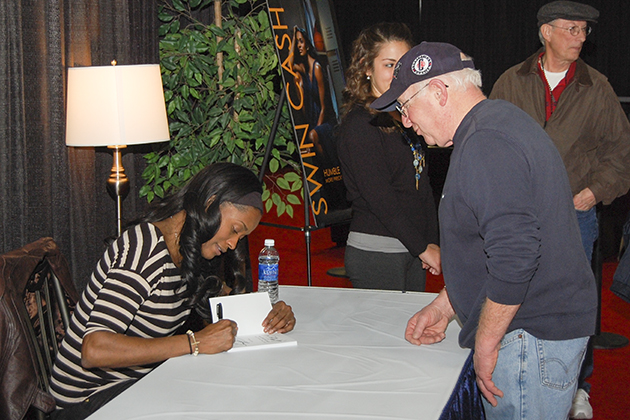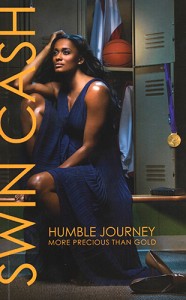
Ninety minutes before the Huskies’ first game in the Big East Women’s Basketball Tournament earlier this month, a line of fans stretched out from a meeting room just off the lobby of the XL Center in Hartford. Inside the room, Swin Cash ’02 (CLAS) smiled broadly as she chatted with everyone, stood to have her photo taken when asked, and signed copies of her new book, Humble Journey: More Precious Than Gold (Empowering You Publishing).
“When I came [to Connecticut], I was a skinny, bowlegged-looking kid freshman year, and I was homesick. All these people would give me a hug,” says Cash, an All-American at UConn, four-time WNBA All-Star, and two-time Olympic gold medalist. “That’s why I don’t take the fans for granted. You spend a couple of minutes with them; you give people a hug and appreciate them.”
Cash also appreciates what she has been able to achieve during her lifetime so far, especially given the obstacles she had to overcome in order to return to competing at the highest level of professional basketball. Those obstacles included surviving cancer, which she reveals for the first time in the book.
After experiencing back problems in 2008, caused by a herniated disk, an MRI also revealed the presence of a cancerous tumor on one of her kidneys.
“We had physicals for the beginning of the season and it really just was the doctor reading the MRI, saying, what’s this little thing over here?” Cash says. “It was a blessing from God. If my back was not bothering me, I would have had that tumor sitting there growing and manifesting. My kidneys were not bothering me.”
At the time, Cash decided not to talk about her diagnosis. Only Detroit Shock head coach Bill Laimbeer and the team trainer knew about it, even as she was being criticized for her struggles on the basketball court. She says that having worked in the media – doing basketball commentary on ESPN and NBC – she understood what was happening, but she was not yet ready to speak about her illness.
“Now I think is the perfect time,” she says. “There are a lot of eyes from kids and adults that are watching me. I felt like I owed it to them to tell my story so they could see the highs and lows, the perseverance, and hopefully, gain inspiration from it.”
Humble Journey is both a narrative of Cash’s life in recent years and an effort to describe how her Christian faith helped her to overcome the obstacles she faced both personally and professionally. While she does not write about it, Cash says publishing the book went against the advice of her business advisors.
“I had to fight for this project because I wanted it to be authentic,” she says. “I didn’t want to do a book with me partnered with [tennis star] Serena Williams or a soccer player. It took a while. I think this is very authentic, transparent. I feel it’s going to help people. I don’t think many athletes or celebrities put themselves out there like that. I wanted to be that person.”
In the book, she describes how she set a goal of returning to be a member of the U.S. Olympic team in 2008 after winning a gold medal as part of the 2004 team. But with her injuries, she was not selected for the squad. Following surgery and with her back health improved, she targeted the 2012 London Games, when Huskies’ head coach Geno Auriemma would lead the team. She describes going through the selection process for the 2012 team and being called into a hotel room in Prague to meet with Auriemma and Carol Callan, Women’s National Team director for USA Basketball, to learn that she had made the team.
“I stood up and hugged them both,” she writes. “I ran to my room and called my mom to tell her the good news. I was very happy and I wanted to keep my family up to speed with all my happenings. They saw my struggle and my grind, and I wanted them to see that this was finally coming together.”
A time to reflect
Cash says her decision to play basketball in China for three seasons provided a time of reflection for her, which helped lead to the book. Often in overseas basketball leagues, there are limits to the number of American players permitted on each team. In China, only one American may be on the roster. The cultural and language differences are wider than in Europe, where many American men and women play professional basketball and may speak Spanish or French.
“In China you are isolated. It was only my translator and I. There was a lot of down time and quiet,” she says. “It was a time for me to reflect, and that’s what I did. I got to see another culture. What I thought of China going in and the people of China was completely different than when I left. I hope my teammates’ impressions of what Americans are and what we do here is completely different from my time spent there.”
In the book, Cash also discusses moving on from what she describes as “toxic relationships,” particularly when asking whether people in your life “are building you up or tearing you down.” She writes about ending a four-year relationship with a boyfriend after determining it was “unhealthy” for her to remain in it.
“In life you deal with relationships; how you handle it is very important, as is being strong enough to deal with it,” she says. “Until I stopped avoiding all my problems and dealt with them, I wasn’t going anywhere. Once I stopped avoidance and began really dealing with them, that’s when I starting seeing change in my life.”
As she prepared to watch the Huskies play against DePaul in the Big East Tournament, Cash says hearing about the end of the Big East Conference that she was part of was “very difficult.”
“The Big East was one of the reasons I went to UConn, because they played at Pitt, at West Virginia, and at Villanova,” says Cash, who grew up in Pennsylvania. “For a kid like me that was close enough for my family to drive to. I needed their support and wanted my family to see me play. It came down to UConn and Tennessee for me. That was an advantage to UConn. It hurts a little bit. I’m waiting to see what happens to UConn. Things are changing, so I guess you have to adapt.”



